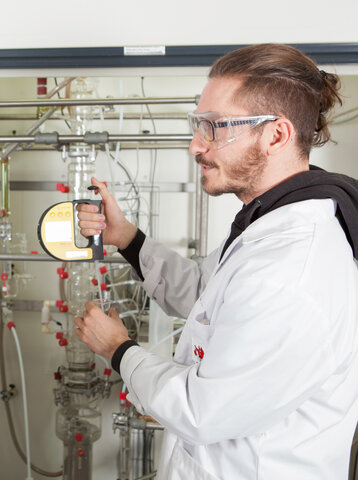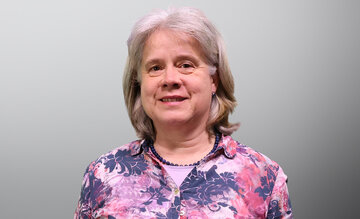Biotechnology for sustainability & economy
Sustainability is THE topic of the future, and the drastic climate changes around the world show us every day how urgently we need new solutions. In this degree programme, we give you the tools you need to create a sustainable future – we train you to become experts who bring modern, environmentally friendly methods from the lab into industrial practice.
Programme content and structure
Entry requirements
Qualified students with a bachelor's degree in natural sciences or engineering (including industrial engineering) from colleges or universities may be admitted to the degree programme. The module composition in the first semester depends on the focus of the bachelor's degree programme.
Graduates of university degree programmes and/or foreign graduates with 180 ECTS points are offered a supplementary/transitional programme by HFU, which compensates in particular for the practical experience and language skills which may be lacking.
NBT specifics
To give you a better idea of our areas of application, here are some questions that our students are working on in their projects:
- Can fungi break down plastic waste?
- How can process simulation be used to shorten and optimize the development of new processes in the bioreactor?
- Can microorganisms from sewage sludge help to extract valuable substances (e.g. organic acids) from waste materials?
- Can raw materials for other foods be obtained from residual products from food production such as sunflower press cake (residual material from sunflower oil production)?
- Can microplastics be used to remove pollutants from water?
What's included
Special features
Graduate with a bilingual degree!
In NBT you can obtain your master's degree bilingually. In the first two semesters, half of the modules are taught in German and the other half in English. The master's thesis can be written in either German or English.
If you achieve CEF level C1 in English or German, depending on your native language, or present a recognised certificate, you can obtain the bilingual degree. Of course, you can also graduate with a lower language level, but without the addition of "bilingual".
Your career prospects
The career opportunities that await you after completing this master's degree are as varied as our projects. Our graduates find jobs wherever the planning, operation and optimisation of biotechnological processes are involved - from the pharmaceutical and chemical industries to environmental technology. Whether you plan and build plants yourself, monitor compliance with environmental protection regulations or work in research institutions on the development of new technologies - with your specialist knowledge, you will contribute to a sustainable world! Your expertise is particularly in demand in industrial companies, supply and disposal companies, colleges, universities, research institutes, engineering offices, consulting firms and licensing and monitoring authorities.
At HFU, you can also pursue a further academic career and a doctorate!
Events
Unfortunately, there are currently no events planned that we can display here. We have compiled an overview of all planned events in the event calendar.

